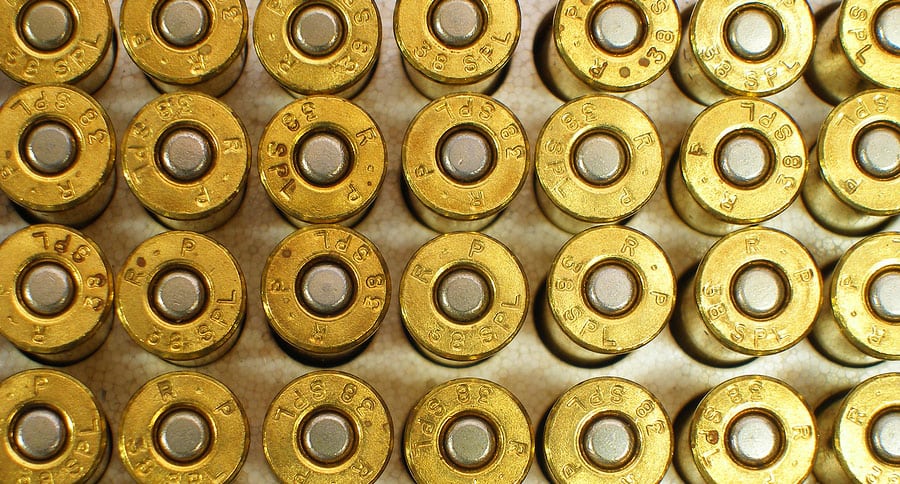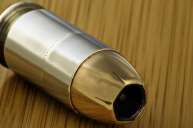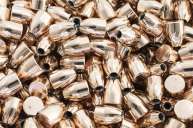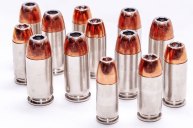These are our top five choices for .38 Special self-defense ammo.
Just like with the 9mm Luger and .45 ACP cartridges, there are a bunch of .38 Special ammo choices out there that are marketed as self-defense loads. While many of them are indeed very good in that role, sorting the good from the bad can be pretty overwhelming. Since you're literally trusting your ammunition with your life, it's important to choose wisely.
In this post, I'm going to talk about why you should be using these specific .38 Special self-defense loads in your .38 Special revolver, regardless of whether it's a snub nose S&W J-Frame, a Ruger LCR, a Colt Cobra or something else.
All the self-defense rounds on this list have undergone thorough testing by Lucky Gunner, which uses FBI-standard ballistic gelatin. They all offer excellent terminal performance due to a good mix of deep penetration, high weight retention, reliable expansion and lots of stopping power.
Winchester 130-Grain PDX1 Defender +P
Featuring a bonded, jacketed hollow-point bullet that has a well-deserved reputation for reliable penetration, high weight retention and lots of expansion, the Winchester PDX1 Defender load is a really good .38 Special ammo choice for self-defense. This ammunition performed better out of a longer-barreled handgun than out of a snub nose in the tests, but the results were still impressive in each case.
Even so, there's a reason the FBI adopted PDX1 Defender as its primary handgun ammunition at one point, as it reliably works under even the toughest conditions.
Federal 130-Grain HST Micro
The Federal HST Micro is an interesting innovation. Basically, it's a regular HST bullet which is extremely well-regarded for self-defense in many calibers seated deep inside the case directly on top of the powder charge.
Why did they do this?
The .38 Special originally came about as a black powder cartridge. As a result, it has a larger case volume than necessary when using modern smokeless powder (Elmer Keith took advantage of this excess space when he developed the .357 Magnum from the .38 Special in the 1930s). Since so much of the case is left empty, powder burn rates can vary. Federal's solution to this problem was simply to eliminate all empty space within the case by seating the bullet right on top of the powder.
They were very successful in their goals and this .38 Special self-defense ammo consistently performed very well in tests from both short-barrel and long-barrel revolvers. Designed for optimal expansion, reliable deep penetration and high weight retention, this is some great standard pressure .38 Special ammo for self-defense.
Remington 125-Grain Golden Saber +P
Due in part to the fact that the Remington Golden Saber features a slightly lighter 125-grain JHP bullet, it also has the highest muzzle velocity of all the ammo on this list. Those JHP bullets hit hard and offer moderate penetration in conjunction with reliable expansion. In short, it still penetrates well enough that it's a really solid choice for self-defense with minimal risk of over-penetration. This characteristic means it might not be the best .38 Special ammo for law enforcement officers, but it's still great for personal-defense applications like concealed carry or home defense.
Winchester 130-Grain Ranger Bonded +P
The bonded JHP bullets used in this Winchester Ranger load virtually immune to core-jacket separation and have earned an excellent reputation for high weight retention, deep penetration, and reliable expansion. Not surprisingly, Winchester Ranger Bonded ammunition is one of the preferred types of ammunition for law enforcement agencies and are an excellent choice for .38 Special self-defense ammo.
Even more impressively, this ammunition performed very well out of both snub-nosed and longer-barreled handguns in tests.
Winchester 130-Grain Train & Defend
Winchester developed a real winner with their Train & Defend line of ammo. The "D" loads use a bonded JHP bullet and the "T" loads use a full metal jacket bullet that's loaded to the same ballistic specifications. The idea is that you're supposed to shoot the cheaper "T" loads at the range and carry the "D" loads for self-defense. Since both loads shoot to the same point of impact and have the same amount of recoil, you'll be able to realistically train with your chosen self-defense handgun without having to shoot the more expensive .38 Special self-defense ammo for practice.
This is not a .38 Special +P load, which makes it great for smaller or recoil shy shooters. Don't worry, even though the Train & Defense line of ammo is billed as a low recoil load, those bonded JHP bullets still have lots of stopping power and consistently performed very well in tests.
Final Thoughts
These are far from the only acceptable choices for .38 Special self-defense ammo. The Hornady Critical Defense load, featuring a 110-grain FTX bullet also performed pretty well. The same goes for the 158-grain semi-watcutter loads by Remington and Winchester.
Though there are lots of other choices out there, it's best to stick with proven defense loads. Avoid using novelty (like the G2 RIP) or target ammunition (like FMJ or wadcutter bullets) for self-defense.
As always, test the accuracy and reliability of your chosen .38 Special self-defense ammo at the range before you start carrying it. Different firearms often prefer different loads and bullet weights. The only way to know how they'll perform in the real world is to spend some time at the range.
Finally, invest the money and energy into becoming proficient with your chosen self-defense gun. A great handgun shooting the highest-quality ammunition is useless if you can't hit your target when it counts.
Like what you see here? You can read more great articles by John McAdams on The Big Game Hunting Blog. Follow him on Facebook, Twitter, YouTube, & Instagram.
NEXT: TOP 6 SELF-DEFENSE HANDGUNS FOR WOMEN
WATCH









